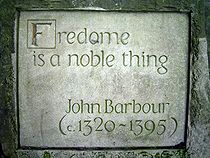
The Brus
Encyclopedia

Chivalry
Chivalry is a term related to the medieval institution of knighthood which has an aristocratic military origin of individual training and service to others. Chivalry was also the term used to refer to a group of mounted men-at-arms as well as to martial valour...
account of the actions of Robert the Bruce and the Black Douglas
James Douglas, Lord of Douglas
Sir James Douglas , , was a Scottish soldier and knight who fought in the Scottish Wars of Independence.-Early life:...
in the Scottish Wars of Independence during a period from the circumstances leading up the English invasion of 1296 through to Scotland's restored position in the years between the Truce of 1328
Treaty of Edinburgh-Northampton
The Treaty of Edinburgh-Northampton was a peace treaty, signed in 1328 between the Kingdoms of England and Scotland. It brought an end to the First War of Scottish Independence, which had begun with the English invasion of Scotland in 1296...
and the death of Thomas Randolph, Earl of Moray in 1332. The poem's centre-piece (literally) is an extensive account of the Battle of Bannockburn
Battle of Bannockburn
The Battle of Bannockburn was a significant Scottish victory in the Wars of Scottish Independence...
of 1314. Barbour's poetic account of these events is a keystone
Keystone (architecture)
A keystone is the wedge-shaped stone piece at the apex of a masonry vault or arch, which is the final piece placed during construction and locks all the stones into position, allowing the arch to bear weight. This makes a keystone very important structurally...
in Scotland's national story.
Patriotic as the sentiment is, it is in more general terms than is found in later Scottish literature
Scottish literature
Scottish literature is literature written in Scotland or by Scottish writers. It includes literature written in English, Scottish Gaelic, Scots, Brythonic, French, Latin and any other language in which a piece of literature was ever written within the boundaries of modern Scotland.The earliest...
. The king is a hero of the chivalric type common in contemporary romance; freedom is a "noble thing" to be sought and won at all costs; the opponents of such freedom are shown in the dark colours which history and poetic propriety require; but there is none of the complacency of the merely provincial habit of mind. The lines do not lack vigour; and there are passages of high merit, notably the oft-quoted section beginning "A! fredome is a noble thing".
Despite a number of errors of fact — for instance the elision
Elision
Elision is the omission of one or more sounds in a word or phrase, producing a result that is easier for the speaker to pronounce...
of three Bruces into the single person of the hero at the beginning of the poem — the account has a greater degree of historical veracity than is usually associated with the verse-chronicle genre (for instance, Blind Hary's Wallace
The Wallace
The Wallace may refer to:-*Sir William Wallace, the Scottish resistance leader*The Actes and Deidis of the Illustre and Vallyeant Campioun Schir William Wallace, an epic poem about the life of William Wallace by the Scottish writer Blind Harry...
composed in the following century). But it is much more than a rhyming chronicle; it contains many fine descriptive passages, and sings the praises of freedom. Its style is somewhat bald and severe. No one has doubted Barbour's authorship of the Brus, but argument has been attempted to show that the text as we have it is an edited copy, perhaps by John Ramsay, a Perth
Perth, Scotland
Perth is a town and former city and royal burgh in central Scotland. Located on the banks of the River Tay, it is the administrative centre of Perth and Kinross council area and the historic county town of Perthshire...
scribe
Scribe
A scribe is a person who writes books or documents by hand as a profession and helps the city keep track of its records. The profession, previously found in all literate cultures in some form, lost most of its importance and status with the advent of printing...
, who wrote out the two extant texts, one preserved in the Advocates Library, Edinburgh, and the other in the library of St John's College, Cambridge
St John's College, Cambridge
St John's College is a constituent college of the University of Cambridge. The college's alumni include nine Nobel Prize winners, six Prime Ministers, three archbishops, at least two princes, and three Saints....
.
Text from The Brus
by Barbour (1375 Transcribed by Ramsay in 1489)
(a) THE POET’S PROEM.
Storyß to rede ar delitabill,
suppoß þat þai be nocht bot fabill,
þan suld storyß þat suthfast wer,
And þai war said on gud maner,
Hawe doubill plesance in heryng.
þe fyrst plesance is þe carpyng,
And þe toþir þe suthfastnes,
þat schawys þe thing rycht as it wes;
And suth thyngis þat ar likand
Tyll mannys heryng ar plesand.
þarfor I wald fayne set my will,
Giff my wyt mycht suffice þartill,
To put in wryt a suthfast story,
þat it lest ay furth in memory,
Swa þat na length of tyme it let,
na ger it haly be forȝet.
For auld storys þat men redys,
Representis to þaim þe dedys
Of stalwart folk þat lywyt ar,
Rycht as þai þan in presence war.
And, certis, þai suld weill hawe pryß
þat in þar tyme war wycht and wyß,
And led thar lyff in gret trawaill,
And oft in hard stour off bataill
Wan [richt] gret price off chewalry,
And war woydit off cowardy.
As wes king Robert off Scotland,
þat hardy wes off hart and hand;
And gud Schyr Iames off Douglas,
þat in his tyme sa worthy was,
þat off hys price & hys bounte
In fer landis renoenyt wes he.
Off þaim I thynk þis buk to ma;
Now god gyff grace þat I may swa
Tret it, and bryng it till endyng,
þat I say nocht bot suthfast thing!

